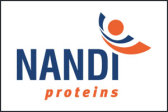|
Parkwalk Newsletter - UK Tech Fund V Investment in Nandi Proteins
|
|
|||||
 |
|
|||||
|
Dear , Nandi Proteins is an established sales, marketing, intellectual property (IP) and licensing company which excels at exploiting patented process technology to improve the functional properties of common proteins. The naming of Nandi Proteins Ltd was inspired by the mother of Shaka, the Zulu King, famed as a warrior and for his famous victories, and immortalised in the film Zulu. Nandi is a Zulu name for girls meaning ‘Sweet’. Founded in 2001 as a spin-out from Heriot Watt University with technology based on the work of Nandi Proteins founder, Dr. Lydia Campbell. Lydia holds a PhD in Biochemistry and has extensive industrial R&D experience from an influential career with Nestle in Germany, Switzerland and South Africa. Using a novel formula, measuring system and process which harnesses a combination of heat, time and temperature control on proteins, Nandi develops functional added value proteins for use in key food and drink markets. Nandi is focused on food industry and ingredients customers for whom its technology provides a range of benefits including lower cost, reduced fat and sugar and clean labelling with no e-numbers. Interest in Nandi's technology is increasing, in particular with the drive to tackle obesity and other weight-related problems combined with government-led initiatives such as traffic-light food labelling, which is leading the food industry to explore new ways of reducing fats and sugars in product. Nandi's technology has potential application in a wide range of proteins used in the food industry, with the total global protein ingredient market size estimated at $10 billion (Source: UBIC Consulting Report 2014). Technology Benefits Potential Benefits of Nandi’s technology include:
Nandi ‘s use of natural protein technology in food manufacturing improves the taste, texture and longevity of produce and reduces manufacturing costs by avoiding unnecessary, or reducing more expensive, ingredients. Nandi is working with proteins for a range of international food manufacturers and its process technology has been utilised in major egg and dairy plants. These collaborations include several new recipes which help to reduce fat and assist food manufacturers in providing clean labels for their products. In a case study developed in-house, Nandi was able to take an existing producer’s Madeira cake and reformulate it using Nandi technology. The result was fat reduction by 25% (a claim which would be allowed on the packaging), eradication of the e-number emulsifiers, generating a cost saving of €29 per kg to the producer. Food Nutritional Labeling The major food manufacturers in the UK are committed to implementing the Traffic Light System, advocated by the Food Standards agency, on front of pack food labeling by the end of 2014. Nandi’s technology can significantly cut down on fats and emulsifiers potentially allowing producers to move from red towards green in this system. This regulatory push has stimulated much recent interest in Nandi’s technology. Commercial Traction Nandi’s plan is to continue to drive market penetration by working with global food sector players to:
Nandi currently has agreements with a number of major food players in the egg and dairy market, including one of the largest egg and egg ingredient producers, a large US food manufacturer and a major European dairy ingredients company. In addition, Nandi has a small level of direct sales. These small direct sales have enabled the company to produce product, in dairy and egg protein, on a commercial scale. Nandi now has the knowledge in-house to scale up the technology to meet potential demand from global customers. Discussions are also underway with a wide range of food companies to explore commercial applications; examples include fat replacement in dairy, bakery and chocolate and sugar reduction. In order to get its product to market, Nandi’s approach is to work closely with its existing and pipeline commercial partners so that its technology can directly address food industry objectives. Investment Case Nandi Proteins has a low capital business model which has put off a number of funds investing as they feel they need to put more funds to work. It is also a reason why the technology has taken so long to get to commercial traction. We feel the company is at a “pivot point”. The general move in the food industry to lower fat solutions and clean labelling driven by regulatory pressure and consumer desire is leading to increased interest in the Nandi technology. This will be further enhanced as Nandi makes progress in its target markets. Management Mike Brennand, Executive Chairman, has wide-ranging experience of funding early stage companies and guiding business growth, primarily in the food and drink sector. Formerly the CEO of Micap plc, Mike is highly adept at dealing with either business to business or business to consumer operations and tapping into dynamic and evolving markets. Dr. Lydia Campbell, Chief Technical Officer, holds a PhD in Biochemistry from the University of Witwatersrand, South Africa and has completed a post-doctoral study in protein chemistry. She spent nine years in R&D and product application with Nestle Switzerland, Germany and South Africa and was latterly project leader in charge of culinary product development and filed several different patents. Since 2000 she has been a part time lecturer and research leader in Food Science at Heriot-Watt University in Edinburgh. Frontier IP Group plc provide Nandi Proteins with a comprehensive range of business development and support services. Chief Executive of Frontier IP Neil Crabb works closely with the Nandi team and frequently attends key meetings with partners. Neil co-founded Sigma Capital Group plc and has considerable experience as an investor and director of a wide range of technology and university spin-out companies. |
||
|
||||||||||||||||||||||||||||||||||||||||||
Fund |
Status |
Gross NAV |
Net NAV |
|---|---|---|---|
| UK Tech I | Part Exited* | 179.0% | 205.6% |
| UK Tech II | Part Exited** | 233.7% | 289.8% |
| UK Tech III | Fully Invested | 82.3% | 100.2% |
| UK Tech IV | Fully Invested | 101.7% | 122.7% |
| UK Tech V | Investing | - | - |
| University of Cambridge Enterprise I | Fully Invested | 143.5% | 165.5% |
| University of Cambridge Enterprise II | Investing | - | - |
| University of Oxford Isis I | Investing | - | - |
| Parkwalk Opportunities | Evergreen | n/a | n/a |
Valuations as of 22nd October 2014. Net NAV includes income tax relief and fees on investment
* Fund I: September 2014: £0.86 returned to investors in cash for every £1.00 invested (at a cost of £0.83 including fees and charges) with the second exit from Fund I
** Fund II: June 2014: £1.43 returned to investors in cash (CGT free) for every £1.00 invested (at a cost of £0.73 including fees and charges) with the first exit from Fund II
Parkwalk’s current portfolio consists of over 30 companies, which have raised in excess of £250m of funding between them since 2010 and over 600 patents protect their technology and processes.
Overall, Funds I-IV’s portfolio comprises of 10% Series ‘A’, 42% Series ‘B’, 21% Pre-IPO and 27% AIM listed companies.
Past performance is no guide to future performance. The price of a fund can fall as well as rise. Investors may receive back less than originally invested.
|
||
|
|||||
